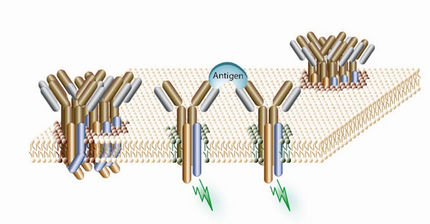New approach to Alzheimer's therapy - researchers identify key target molecule
Advertisement
Researchers from the German Centre for Neurodegenerative diseases (DZNE) and the Ludwig-Maximilians-Universität (LMU) in Munich have shown that the ADAM10 protein can inhibit the formation of beta-amyloid, which is responsible for Alzheimer’s disease. ADAM10 acts like a pair of molecular scissors to cut the protein from which beta-amyloid is formed, effectively preventing the formation of beta-amyloid. This makes ADAM10 a key molecule in Alzheimer’s therapy.
The brains of Alzheimer patients have high accumulations of the material beta-amyloid, which appear in the form of plaques. The precursors of these plaques are believed to be the underlying cause of the nerve cell loss that leads to the disruptions in memory that characterize Alzheimer’s disease. The main aim of many Alzheimer therapies is therefore to inhibit the formation of beta-amyloid. Since beta-amyloid is cleaved from the so-called amyloid precursor protein (APP), scientists have focused on stopping the two enzymes that attack the precursor protein. These act like molecular scissors and cut out the beta-amyloid fragment. Blocking these scissors precludes the formation of beta-amyloid.
DZNE and LMU researchers have succeeded in identifying an enzyme known as alpha secretase, which cleaves the amyloid precursor protein (APP) without forming beta-amyloid. Up to this point three different candidates for this function had been under consideration, but the research team has now been able to show that the enzyme ADAM10 alone is responsible for the specific cleavage. Dr. Stefan Lichtenthaler and his team developed highly specific antibodies that can identify the different cleavage products of the precursor protein in the brain cells of mice and in human cell cultures. Using a special technique called RNA interference, the researchers managed to block each of the three genes that code for the three ADAM enzymes under suspicion. An analysis of the cleavage products revealed that the ADAM10 gene was the only one able to prevent the formation of beta-amyloids. They confirmed their results using mass spectrometry.
“In ADAM10 we have identified a target molecule that plays a central role in the development of the molecular processes in Alzheimer’s disease. We know that ADAM10 is less active in Alzheimer patients,” says Dr. Lichtenthaler. When ADAM10 is less active, the precursor protein is more likely to be cleaved in a way that promotes the formation of beta-amyloids.
“It is possible that less ADAM10 activity could increase susceptibility to Alzheimer’s disease. If that is the case, stimulating ADAM10 could be an important mechanism for therapy. But our antibodies also open up new possibilities for diagnosing and preventing the disease,” says Lichtenthaler. The antibodies could be used to measure ADAM10 activity in spinal fluid and, by extension, identify persons who may have an increased risk of developing Alzheimer’s disease. A series of experiments to examine this possibility is already underway.
Original publication: Peer-Hendrik Kuhn et al.; "ADAM10 is the Physiologically Relevant, Constitutive Alpha-Secretase of the Amyloid Precursor Protein in Primary Neurons"; EMBO Journal, published online, 30 July 2010


















































